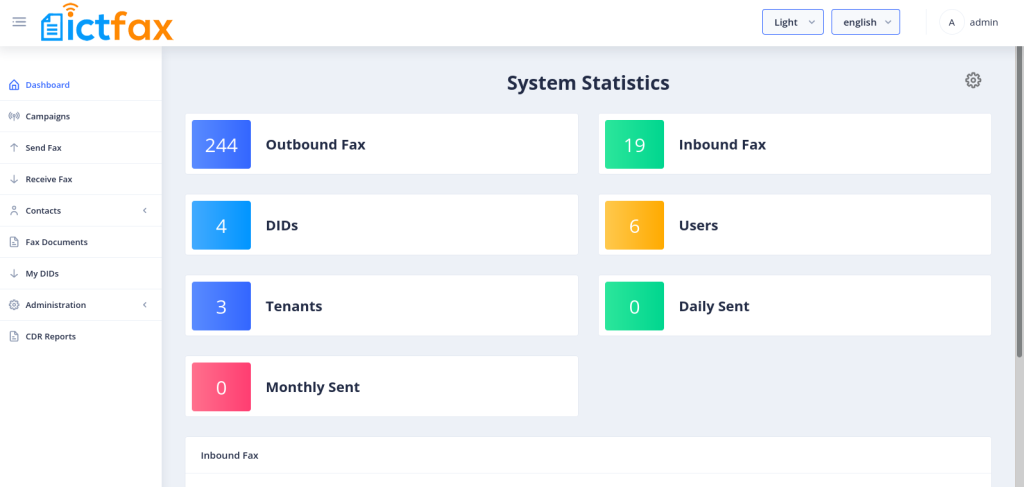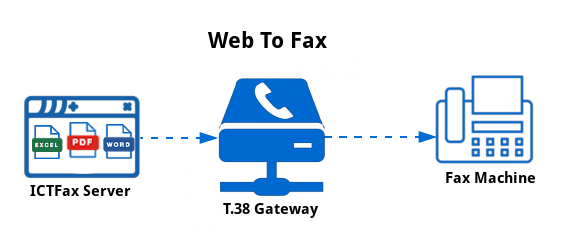Embracing the Digital Shift: Unlocking the Power of Fax Servers in Modern Business Communication. In today’s digitally dominant era, fax may appear antiquated. However, fax servers have emerged as an invaluable asset for contemporary organizations, transforming the transmission of information. By harnessing the capabilities of fax servers, businesses can streamline operations, boost productivity, and embrace digital transformation. Join us as we delve into the future of fax and unveil the pivotal role fax servers play in modern business practices. This article explores the advantages, hurdles, and optimal strategies for leveraging fax servers amidst the digital landscape of today.
Understanding Fax Server:
A fax server is an advanced computerized system or software that facilitates the electronic transmission of fax documents across networks. Acting as a bridge between traditional fax machines and the digital realm, it enables the conversion of faxed documents into digital files, effortlessly transmitted via email, internet, or other network connections.
By eliminating the reliance on physical fax machines, paper documents, and manual processes, fax servers present a centralized solution for managing fax communications. They empower businesses to streamline document workflows, amplify productivity, and achieve greater operational efficiency. Say goodbye to outdated methods and embrace the transformative capabilities of a fax server.

How does a Fax Server Work?
A fax server is a network-connected device designed to efficiently transmit and receive faxes. Typically integrated into a local area network (LAN), it provides the convenience of shared access for multiple users. Fax servers enable the exchange of faxes not only between other fax servers but also with traditional fax machines. Experience the versatility and connectivity of a fax server as it revolutionizes the way faxes are sent and received in today’s interconnected world.
Here is how a fax server works:
- When a user sends a fax using a fax server, the fax is first converted into a digital format.
- The digital fax is then transmitted over the network to the fax server.
- The fax server then converts the digital fax back into an analog format and sends it to the recipient’s fax machine.
When a fax is received by a fax server, the following steps are taken:
- The fax server converts the analog fax into a digital format.
- The digital fax is then stored on the fax server’s hard drive.
- The user who sent the fax is notified that the fax has been received.
Fax servers can provide a number of benefits for businesses, including:
Improved productivity: Enhancing Productivity through Automation: The Impact of Fax Servers on Business Efficiency. Fax servers offer a powerful solution to boost productivity by automating faxing processes. One notable example is the ability to configure a fax server to automatically send recurring documents like invoices. By leveraging this feature, businesses can liberate their employees’ time and redirect their efforts towards critical tasks such as customer service or sales. Discover how implementing a fax server can unlock new levels of efficiency, enabling your workforce to prioritize value-added activities that drive business growth.
Reduced risk of lost or delayed faxes: Fax servers play a crucial role in minimizing the potential for lost or delayed faxes. When a fax is transmitted through a fax server, it is securely stored on the server’s hard drive until it reaches the intended recipient. This robust mechanism offers a safety net in case of transmission hiccups, as any lost or undelivered faxes can be resent directly from the fax server. Discover how implementing a fax server can provide peace of mind and ensure the seamless delivery of critical fax documents, eliminating the risks associated with lost or delayed transmissions.
Secure faxing: Fax servers can provide a secure way to transmit documents. Faxes sent using a fax server are encrypted, which helps to protect them from unauthorized access.
If your business still relies on traditional fax machines, then you may be missing out on the many benefits of using a fax server. A fax server can help you improve your productivity, reduce your risk of lost or delayed faxes, and protect your sensitive documents.
Benefits of Fax Server:
Fax servers offer a number of benefits for businesses, including:
Improved productivity: Fax servers can help businesses improve productivity by automating faxing tasks. For example, a fax server can be configured to automatically send out invoices or other documents on a recurring basis. This can free up employees to focus on other tasks, such as customer service or sales.
Reduced risk of lost or delayed faxes: Fax servers can help to reduce the risk of lost or delayed faxes. When a fax is sent using a fax server, it is stored on the fax server’s hard drive until it is received by the recipient. This means
that if a fax is lost in transit, it can be resent from the fax server.
Secure faxing: Fax servers can provide a secure way to transmit documents. Faxes sent using a fax server are encrypted, which helps to protect them from unauthorized access.
Centralized management: A fax server can be centrally managed, which can make it easier to track and manage faxing activity.
Scalability: Fax servers can be scaled to meet the needs of growing businesses.
Cost-effectiveness: Fax servers can be a cost-effective alternative to traditional fax machines.
If your business still relies on traditional fax machines, then you may be missing out on the many benefits of using a fax server. A fax server can help you improve your productivity, reduce your risk of lost or delayed faxes, and protect your sensitive documents.
Here are some additional benefits of using a fax server:
Improved communication: Fax servers can help businesses improve communication by making it easier to send and receive faxes. This can lead to faster turnaround times and improved customer satisfaction.

Increased efficiency: Fax servers can help businesses increase efficiency by automating faxing tasks. This can free up employees to focus on other tasks, such as customer service or sales.
Reduced costs: Fax servers can help businesses reduce costs by eliminating the need for traditional fax machines. This can save businesses money on paper, toner, and maintenance costs.
How to Choose a Fax Server:
Here are some factors to consider when choosing a fax server:
Number of users: The number of users utilizing the fax server is a key factor in determining the appropriate size and capacity of the server. For small businesses with a limited number of users, a smaller fax server can often suffice. On the other hand, larger businesses with a substantial user base will require a more robust and scalable fax server to meet the demands of a higher volume of fax transmissions. Assessing the specific user requirements and workload is essential to ensure that the selected fax server can effectively handle the anticipated workload and accommodate the number of users in your business environment.
Features: What features are important to you? Some fax servers come with features such as the ability to send and receive faxes from other fax servers, the ability to store faxes on the fax server’s hard drive, and the ability to encrypt faxes.
Price: How much are you willing to spend on a fax server? Fax servers range in price from a few hundred dollars to several thousand dollars.
Conclusion:
In conclusion, a fax server can be a valuable tool for businesses looking to enhance productivity and streamline their communication processes. By transitioning from traditional fax machines to a digital fax server solution, organizations can enjoy numerous benefits.
Implementing a fax server allows businesses to automate the document transmission process, saving time and minimizing errors. Features such as bulk faxing, scheduling, and automated retries ensure efficient and reliable document delivery. Additionally, the security and compliance measures provided by fax servers ensure the confidentiality of sensitive information during transmission.
Leveraging Open Source in ICT
